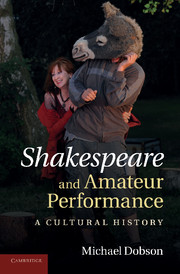Book contents
- Frontmatter
- Contents
- List of illustrations
- Acknowledgements
- Introduction: Shakespeare in culture
- 1 Shakespeare in private: domestic performance
- 2 Shakespeare in public: the resisted rise of the amateur dramatic society
- 3 Shakespeare in exile: expatriate performance
- 4 Shakespeare in the open: outdoor performance
- Conclusion
- Notes
- Index
3 - Shakespeare in exile: expatriate performance
Published online by Cambridge University Press: 05 December 2011
- Frontmatter
- Contents
- List of illustrations
- Acknowledgements
- Introduction: Shakespeare in culture
- 1 Shakespeare in private: domestic performance
- 2 Shakespeare in public: the resisted rise of the amateur dramatic society
- 3 Shakespeare in exile: expatriate performance
- 4 Shakespeare in the open: outdoor performance
- Conclusion
- Notes
- Index
Summary
mowbray … The language I have learnt these forty years,
My native English, now I must forgo,
And now my tongue's use is to me no more
Than an unstringèd viol or a harp,
Or like a cunning instrument cased up,
Or, being open, put into his hands
That knows no touch to tune the harmony.
(Richard II, 1.3.153–9)The movement from private theatricals to civic amateur dramatic societies charted across the two previous chapters – whereby non-professional productions of Shakespeare ceased to address themselves solely to lateral, aristocratic networks of connoisseurs and applied themselves instead to serving entire local communities, across class lines – had effects which were felt not just within Britain but wherever English-speaking people found themselves with time on their hands and an audience within hailing distance. In 1607, when whichever member of the Red Dragon's crew cast as Mowbray in Richard II lamented the linguistic impotence enforced by banishment from England, he could not have foreseen the extent to which Britain's growing mercantile, diplomatic and military commitments around the globe would come to make such sentiments seem largely obsolete. Shakespeare travelled with the national language, whether its speakers were in foreign parts voluntarily or under duress. The most spectacular instances of British expatriate Shakespeare, though they are now largely and perhaps deliberately forgotten, undoubtedly occurred during the Second World War, when a combination of the pre-war Little Theatre movement, mass conscription and the scale of early Allied defeats produced a captive army on Axis soil which was better qualified to keep its spirits up with amateur dramatics than any military force before or since.
- Type
- Chapter
- Information
- Shakespeare and Amateur PerformanceA Cultural History, pp. 109 - 151Publisher: Cambridge University PressPrint publication year: 2011



